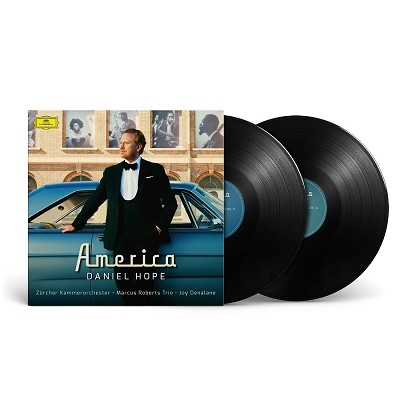豊かなアメリカ音楽の多様性を探求したアルバム
ヴァイオリニスト、ダニエル・ホープが豊かなアメリカ音楽の遺産を追い求めたアルバム。ガーシュウィン、コープランド、バーンスタイン、クルト・ヴァイル、フローレンス・プライス、デューク・エリントン、サム・クックによるクラシック、ジャズ作品の新たな素晴らしい編曲で、様々なアメリカ音楽を探究しています。
ダニエル・ホープはソリストとしてのキャリアで印象深く、様々な受賞歴でも知られていますが、それだけではなくその音楽の多才さ、また人道主義的な貢献でも称えられています。
新たな編曲は室内オーケストラ、他の楽器、声楽などを伴うヴァイオリン編曲となっており、ジョイ・デナラーニや有名なジャズ・ピアニストのマーカス・ロバーツと共演しています。
ベルリンを中心に活躍しているダニエル・ホープの最新アルバムは、アメリカの豊かなレパートリー、そのルーツや特色を探究しています。「曲を聴いてそれがアメリカの曲だと分かる時、何がそれをアメリカの音楽の音にしているのだろうか」とホープは語ります。このアルバムにその答えがあります。
ユニバーサル・ミュージック/IMS
発売・販売元 提供資料(2022/02/10)
Violinist Daniel Hope perhaps overestimates the degree to which American music is terra incognita for his European listenership; West Side Story has had many London productions, and for a long time, Gershwin was more common on European concert music programs than he was stateside. "We know a piece is from America the moment we hear it," Hope says, "But what makes music sound American?" One may not get an answer to this here, despite Hopes being pictured in front of a 1960s Ford Fairlane, but he does offer an attractive range of vernacular-tinged American pieces, arranged for violin and orchestra by Paul Bateman with a variety of accompaniments. (The West Side Story Suite here is not the same as the one performed by Joshua Bell some years ago.) The jazzy Gershwin Song Suite doesnt work so well; the violin isnt integrated with whats happening in the jazz trio, and a similar problem appears in A Change Is Gonna Come, despite a fine vocal by Joy Denalane. However, the rest of the program is very strong. Hope moves into music where the violin fits logically, including longer sets of tunes by Bernstein and Weill, a piece of Ellingtons Black, Brown & Beige (the program might have benefited from a few more of these), and more "classical" selections by Copland. The final America the Beautiful is pure Hope, schmaltzily appealing. Hopes Zurcher Kammerorchester by now has very supple responses to what he is doing. This is a release that will please Hopes growing cadre of fans. ~ James Manheim
Rovi
Violinist Daniel Hope perhaps overestimates the degree to which American music is terra incognita for his European listenership; West Side Story has had many London productions, and for a long time, Gershwin was more common on European concert music programs than he was stateside. "We know a piece is from America the moment we hear it," Hope says, "But what makes music sound American?" One may not get an answer to this here, despite Hopes being pictured in front of a 1960s Ford Fairlane, but he does offer an attractive range of vernacular-tinged American pieces, arranged for violin and orchestra by Paul Bateman with a variety of accompaniments. (The West Side Story Suite here is not the same as the one performed by Joshua Bell some years ago.) The jazzy Gershwin Song Suite doesnt work so well; the violin isnt integrated with whats happening in the jazz trio, and a similar problem appears in A Change Is Gonna Come, despite a fine vocal by Joy Denalane. However, the rest of the program is very strong. Hope moves into music where the violin fits logically, including longer sets of tunes by Bernstein and Weill, a piece of Ellingtons Black, Brown & Beige (the program might have benefited from a few more of these), and more "classical" selections by Copland. The final America the Beautiful is pure Hope, schmaltzily appealing. Hopes Zurcher Kammerorchester by now has very supple responses to what he is doing. This is a release that will please Hopes growing cadre of fans.
Rovi



